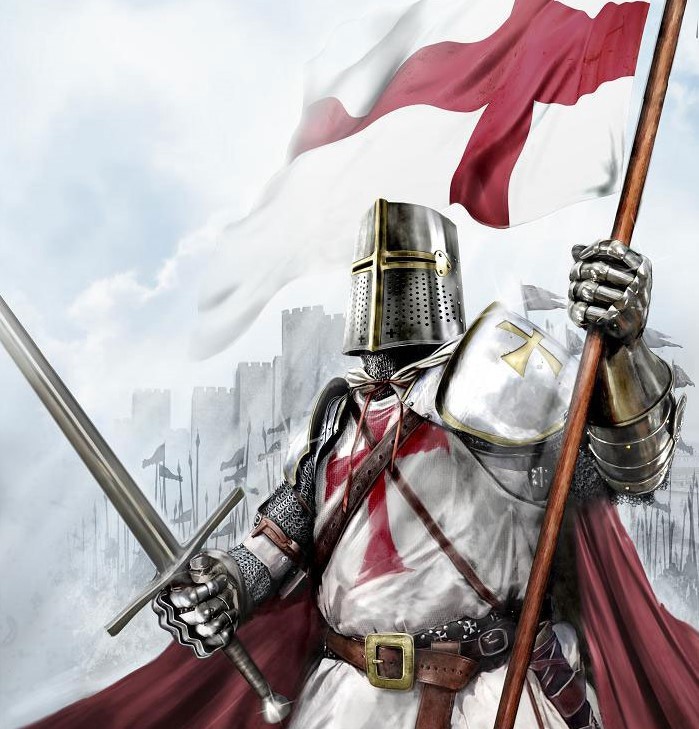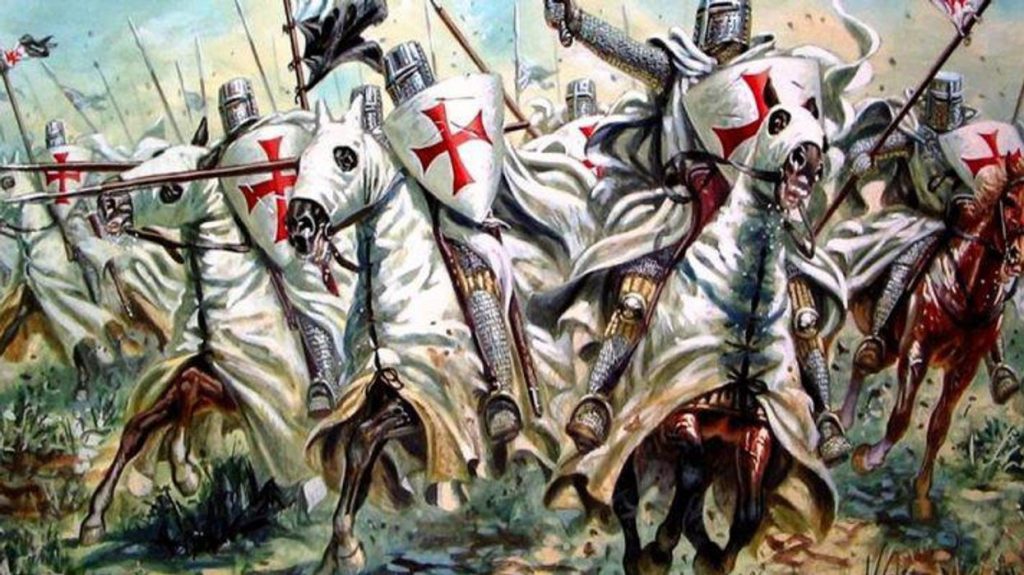Jihad. Holy war. The Crusades.
These events took place in the Middle East mainly between the 11th and 13th centuries.
They happened just as European Christianity was emerging out of the Dark Ages and rising to compete with the Islamic world.
This period of history was a contested and bloody one — and it would forever reshape ideas about empire, borders, and identity.
The impact is still being felt to this day.
A golden opportunity?

Source: History of Yesterday
Let’s face it. War is never the most pleasant time to live through — and a religious conflict is even less appealing. But even as war traumatises and destroys, it also sparks its fair share of creativity. This, in turn, leads to unexpected innovation. Here’s a case in point:
- When the Europeans gained a foothold in the Middle East and captured Jerusalem, a flood of Christian pilgrims made their way to the Holy Land.
- However, the Muslims were not so easily defeated. They remained a potent force, continuing to launch hit-and-run attacks on their enemies.
- Unfortunately, the European military presence on the ground was spread thin. Their authority was shaky at best, and they only had a fragile hold on their territories.
- The Christian pilgrims travelling between cities became easy targets for bandits and raiders. Many pilgrims fell prey to murder and robbery.
In 1118, Hugues de Payens, a French knight, was reportedly moved by the suffering of these pilgrims. So he approached Baldwin II, the reigning king of Jerusalem, with an idea:
- Hugues de Payens wanted to establish a quasi-religious military order. Its mission? To protect and guide pilgrims in the Holy Land.
- Baldwin II gave his blessing and offered Hugues de Payens the chance to build his headquarters at the Temple Mount. This was a place of great historical significance. It was the site of the captured Al-Aqsa Mosque, and as lore would have it, also the site of King Solomon’s temple.
- Hugues de Payens called his monastic order the Poor Fellow-Soldiers of Christ and of the Temple of Solomon. Yes, a title that’s quite a mouthful. But, in time, Hugues de Payens and his brethren would become known by a more iconic name: the Knights Templar.
The world’s first multinational corporation

Source: Black Belt Magazine
This is the stuff that myths and legends are made of:
- The Knights Templar were warrior-monks who transcended their humble roots to form the world’s first multinational corporation.
- In the process, they may have laid the foundations for the modern banking system as we know it today.
Here are some critical facts:
- Members of the Knights Templar took oaths of poverty, chastity, and duty.
- They were led by a grand master, who was elected for life and based in Jerusalem. The grand master, in turn, was answerable only to the pope in Rome.
- At their peak, they reportedly controlled a network of over 1,000 territories throughout Europe and the Middle East.
- They were fierce fighters who acted as ‘shock troops’, riding heavily armoured on warhorses to smash through enemy lines.
- Saladin — the Muslim leader with a formidable reputation himself — reportedly feared and respected the Knights Templar for their battle prowess.
Now, here’s the curious thing. Despite their vows of poverty, the Knights Templar actually became quite wealthy and powerful. Here’s why:
- Before pilgrims journeyed to the Holy Land, they would place their gold and silver with a local Templar office in Europe.
- When they did, they would receive an official document — similar to a traveller’s cheque — declaring the value of their deposit.
- When the pilgrims eventually reached the Holy Land, they could visit any local Templar office and redeem the value of their deposit by presenting this cheque.
- These Templar documents had security features that were outstanding for their time. They were cleverly encrypted with a cipher and could only be ‘unlocked’ with the right methods.
- Well, eureka. By offering this ingenious service, the Knights Templar became a critical part of European life — and they also diversified into loans, pensions, and wills.
- This expanded the power base of the Templars even more — to the extent that they actually became a state within a state. A law unto themselves. Moving and trading freely across borders. And here’s the best part: they could operate tax-free, by virtue of their quasi-religious status.
The end of a dream
Unfortunately, towards the middle of the 12th century, the mood began to sour:
- The different European kingdoms started to disagree about their role and purpose in the Holy Land. The political bickering was made worse by the fact that Saladin managed to recapture Jerusalem in 1187, puncturing the myth of Christian superiority.
- Over the next century, control of Jerusalem would bounce back and forth between Muslim and Christian armies, even as the European presence in the Middle East steadily crumbled.
By 1303, the Knights Templar would lose all their territories in the Holy Land. This appeared to be a turning point for the monastic order:
- Without a stronghold in the Middle East, the very existence of the Knights Templar was called into question.
- What were they good for, if there were no longer any pilgrimages to protect?
- Resentments became magnified. And when the dominos fell, they fell quickly.
In 1307, a grim event took place. King Philip IV of France issued an arrest warrant. It reportedly said:
‘God is not pleased. We have enemies of the faith in the kingdom.’
The Templars were accused as blasphemy, idolatry, and homosexuality — and they were rounded up, detained, and tortured:
- Under pressure from King Philip, Pope Clement V also issued his own decree, calling on all Christian kingdoms to arrest the Templars and seize their wealth.
- Once this brutal inquisition got started, there was no stopping it. The result was a foregone conclusion. Many Templars were burned alive at the stake, under forced confessions. It was a sudden and shocking end to what was once an illustrious monastic order.
This was a tragedy — and the motive behind it was arguably a malicious one:
- You see, King Philip had been living beyond his means for some time. He had taken up huge loans from both Jewish moneylenders and the Knights Templar. But now, with the French economy slumping and the local currency facing devaluation, the king was reluctant to repay his expensive debts. So he chose the easiest way out: getting rid of his creditors.
- The Jews were simple enough to deal with. The king simply expelled them from France. They were a powerless ethnic minority and could not possibly fight back.
- The Templars — with their vast holdings and military presence — represented a bigger threat. So the king needed to deal with them more cruelly.
But here’s where the story takes an unusual turn. Legend has it that Jacques de Molay, the last grand master of the Knights Templar, remained defiant until the very end. He made a statement just as he was being burnt alive:
‘God knows who is wrong and has sinned. Soon a calamity will occur to those who have condemned us to death.’
Sure enough, Pope Clement would die one month later. King Philip would also die shortly after. Poetic justice? Absolutely:
- The Knights Templar may be gone, but their legacy survives to this day.
- Europe is a powerhouse in finance — no doubt building upon the principles first established by the Templars.
- Money-lending. Cross-border fund transfers. Global asset protection. Europe does all this at an exceptionally high level of quality. The continent’s robust infrastructure, ancient institutions, and deep pool of talent makes it the perfect hub to connect East and West.
- More importantly for us, Europe has a strong tradition of dividend-paying companies. This makes it a very attractive location for income-seeking investors. We are continuing to watch and monitor a number of high-value, high-conviction European assets. They may represent opportunities beyond the radar that you won’t find anywhere else.
It’s time to have your say
I hope that you’ve enjoyed reading our articles as much as we’ve enjoyed writing them.
Your prosperity is our focus — which is why we are always working hard to uncover new opportunities beyond the radar for you.
By the way, I have a small favour to ask:
- Would you like to write a review of our work here at Wealth Morning?
- Do you want to let us know if our stories have inspired you in a positive way?
- Do you want to let us know if our stories have helped you become a more successful investor?
We truly value your feedback.
It encourages us. It helps us to do better. It helps us to reach further.
So, if you’d like to leave us a review, it’s quick and easy. It will only take two minutes of your time:
❤️ Please click here to review us now on Trustpilot.
Thank you so much in advance for your kindness and generosity.
Your readership keeps us going!
Regards,
John Ling
Analyst, Wealth Morning
(This article is general in nature and should not be construed as any financial or investment advice. To obtain guidance for your specific situation, please seek independent financial advice.)





John is the Chief Investment Officer at Wealth Morning. His responsibilities include trading, client service, and compliance. He is an experienced investor and portfolio manager, trading both on his own account and assisting with high net-worth clients. In addition to contributing financial and geopolitical articles to this site, John is a bestselling author in his own right. His international thrillers have appeared on the USA Today and Amazon bestseller lists.